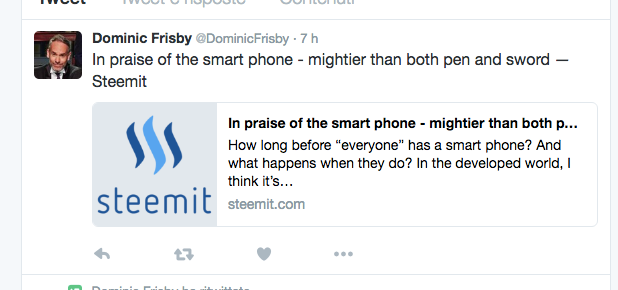In praise of the smart phone - mightier than both pen and sword
How long before “everyone” has a smart phone? And what happens when they do?
In the developed world, I think it’s fair to say that pretty much anyone who wants one already has a smartphone. From the millionaire to the migrant worker, from the boardroom to the black economy, smartphones are mainstream. They are not a luxury confined to the few. Even those who sleep rough now often do so with a smart phone.
As for the developing world, more people (over 6bn) now have a mobile (cell) phone than have a toilet. How long before that mobile phone becomes a smartphone?
Little more than five years, according to this year’s Ericcson Mobility Report. By 2021 there will be over 6.3bn smartphone subscriptions in a global population of just over 7 billion. (Not every subscription, some of which are inactive, equates to a user. Assume users equal 65-70%). Meanwhile global mobile broadband subscriptions will reach 7.7 billion by 2021 – more than there are people. The vast majority of the world’s population will soon be online and a smartphone is the first way by which most will experience the internet.
Such is the rate of improvement and innovation, the technology has became almost unimaginably cheap. The things we are now able to do – and the price we are able to do them for - would have seemed almost impossible 20 years ago. Possibilities that were once only available to a select few, if anyone at all, are now available to every man. And it’s all only going to get cheaper and better.
Long-distance phonecalls used to cost a fortune. Now we can communicate with just about anyone anywhere – whether it’s via email, SMS, What’sApp, Skype, Facetime, Facebook or Twitter – at almost zero cost. Before long almost everyone in the world is going to be just a few clicks of a keyboard away. I’d say maybe three of the proverbial six degrees of separation will soon erased.
Kids can now make films that previously would have required multi-million-dollar budgets. We can translate just about any language. Mapping is simple. We can measure distance, altitude, air pressure, heart health – any number of different things.
And, perhaps above all, we have instant access to vast quantities of information. In 1996, if you wanted to know something, you had to make several (often expensive) phonecalls or a (time-consuming) trip to the library. Now a few taps on your phone tells you everything you need to know. And they say that knowledge is power.
But more than half the world's population has been excluded from all this, either technologically or financially (they didn't have the gear, the internet access and over 3bn are unbanked). Within a few years much of this will no longer be the case - and the smartphone is the key ingredient in the solution.
A stroll through any developing world city shows there is no shortage of people who want to talk to you, to sell you stuff, to trade and exchange with you. The world is full of people who want to learn, communicate, trade, exchange and, generally, improve their lot. So many new possibilities are going to open up to the world's poor that did not previously exist – to educate themselves, to make new contacts, to create, to buy and sell. How are they going to use this new found power?
Meanwhile the developed world will have several billion potential new people to outsource jobs to, to sell products to and to receive products from. That is a lot of new trade. Trade and exchange is, of course, how we progress.
When you consider the sheer weight of numbers - billions of people - the possibilities are quite daunting. My view is that we are on the cusp of a global economic boom of historic proportions. Rather as the Industrial Revolution enabled many to escape rural poverty and, within a generation, form a new middle class, so is something similar about to happen, but on a much bigger scale.
Not all developments will be “good”, of course. Many will use their newfound power for nefarious purposes, though the greater flow will be positive and progressive. Nor will progress be equal. Many will be held back by tyrannical or censorious governments, and the process will be slower for them. But the sheer weight of prosperity and progress elsewhere mean this is a war those governments will eventually lose. Nor will this prosperity be instantaneous. It will take time. It will be incremental. It is a generational shift. But this is still an inevitable tide in the affairs of men. Rather as the Industrial Revolution enabled many to escape rural poverty and, within a generation, form a new middle class, so is something similar about to happen, but on a much bigger scale. The smartphone will be the conduit.
We should be thankful for this wonderful invention, mightier than both the pen and the sword.
I only wish my kids would spend less time on theirs.
Dominic Frisby is a financial writer and comedian from London.
Link: http://reaction.life/humble-smartphone-mightier-pen-sword/
You're the author? If yes please prove it.
verified :)

I am Dominic Frisby. My internet name is frizzers. Email me at frizzers at gmail dot com if you don't believe me or follow me on Twitter
@frizzers welcome. looking forward to your new posts
Nice piece and deserves an up-vote. Following and looking forward to reading more of your posts. I joined STEEMIT a few weeks ago and I have seen a remarkable increase in the quality of posts. An amazing concept. I recently posted a couple of articles about STEEMIT, the future of BLOCKCHAIN, Social Media CryptoCurrencies, and one about Dan & Ned. You may find them interesting to read. You can also catch us Twitter✔. Cheers. Stephen
Thank you!
You are very welcome. Cheers. Stephen